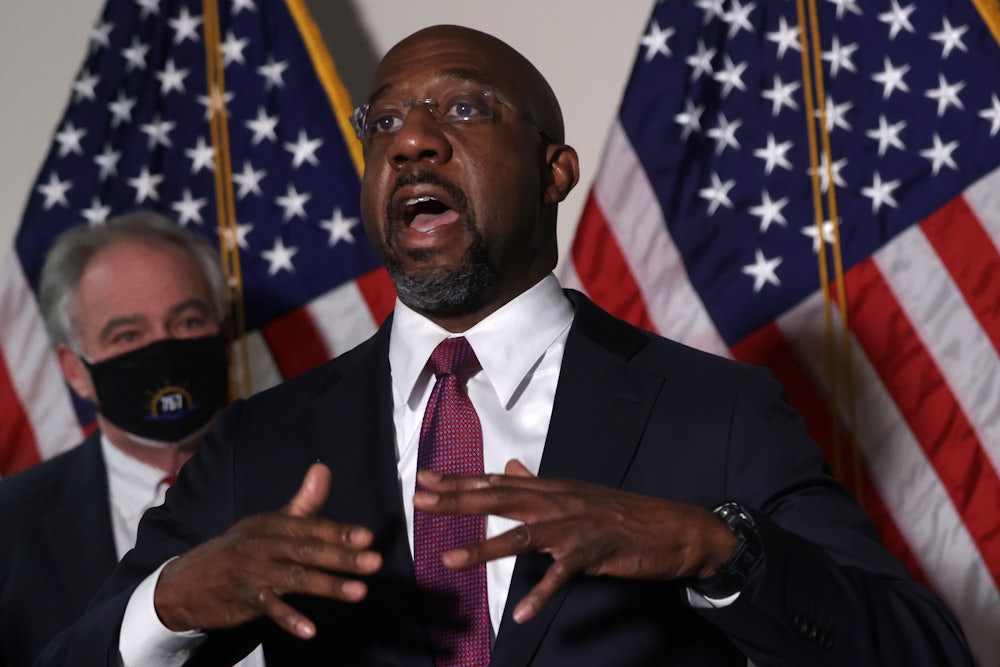Spring has sprung and with it come primaries, which are going to start kicking into gear fairly soon. Texas, in fact, already held its contest back in March; the state will hold runoff voting on May 24 in races where no one topped 50 percent. Of these, the most notable is between conservative Democratic incumbent Henry Cuellar and progressive challenger Jessica Cisneros in House’s 28th district. Ohio, where erstwhile reasonable human turned Trumpy extremist J.D. Vance (who just snared 45’s endorsement) is facing off against perennially unreasonable human and Trumpy extremist Josh Mandel, resembles a passageway into America’s moral sewer; its primary is looming on May 3.
It’s time to start paying attention. To get you caught up, let’s size up the state of play in some key Senate races, starting with the top four seats Democrats need to defend.
Georgia. Democrats are desperate for Raphael Warnock to hold the seat he won by a whisker in 2020. He seems a completely admirable and honorable man, and he’s running against an opponent who is both a complete idiot (he recently railed against “CTR,” in an attempt to critique critical race theory) and basically a self-acknowledged domestic abuser. (“I’m always accountable to whatever I’ve done.” Gee, thanks.) But Herschel Walker, a former University of Georgia Heisman Trophy winner, has Trump’s backing and is running right after the Dawgs won the national championship. That makes everybody feel good about Georgia football, the new season of which will be well underway come November. He’s up in most polls by one to five points. (I’m using FiveThirtyEight numbers in this column except where noted.) While this nincompoop becoming a senator would be a tragedy, it would hardly be the first. Maybe Stacey Abrams’s vaunted turnout machine can help Warnock, but she’s down about five points in most polls to incumbent Brian Kemp.
Arizona. Democratic incumbent Mark Kelly won the special election in 2020, outpolling Joe Biden in a state that has moved from red to purple. His likely GOP opponent (the primary is August 2) is Attorney General Mark Brnovich, who is not quite so Trumpy. Earlier this month he released an “interim report” on the 2020 election that pointedly did not mention mass voter fraud or other Big Lie talking points. Kelly leads in the polls, but they’ve narrowed from 10 points last year to 2 or 3 in recent months. That’s inflation, and Biden is having a drag on Kelly’s popularity. It’s going to be a tough race.
Nevada. First-term Democratic incumbent Catherine Cortez-Masto is in a tough contest, too. The two serious Republicans (who will compete in the state’s June 14 primary) are Adam Laxalt and Sam Brown. Recent polling (except for one outlier) has both of them leading her by anywhere from one to seven points.
New Hampshire. Maggie Hassan is another first-term Democrat. She lucked out when GOP Governor Chris Sununu decided not to run, leaving the Republican primary field to the backbenchers. As such, she’s holding a steady lead over her two main challengers by an average of six to seven points. It looks for now like she ought to be able to hold on.
Now we move to the five seats where Democrats have a chance for a pickup.
Pennsylvania. Probably the most interesting Senate race in the country on both sides, with primaries coming up soon, May 17. The Republican side features two more Trumpy clowns—David McCormick and Mehmet Oz—trapped in a self-abasement contest with each other. The latter won Trump’s surprise endorsement. RealClearPolitics has McCormick up four, but I’ll note that the only post-Trump endorsement poll has Oz up three.
On the Democratic side, John Fetterman is way ahead of Conor Lamb, who has yet to gain much traction. Some are worried that Fetterman is too far left and lacks electability; he once backed Bernie Sanders’ presidential bid but now opposes a fracking ban, which Sanders supported. In late January, the state Democratic committee met in Harrisburg, and these insiders showed pretty clearly what they think: Lamb got 169 votes to Fetterman’s 64. But Fetterman is so far ahead in the race that he skipped a recent debate. Lamb had $3 million in cash on hand as of the end of 2021 (the last filing); Fetterman had $5.3 million. No doubt we’ll be seeing some nasty ads in the home stretch, with Lamb’s targeting Fetterman’s viability in a general. Fetterman “reads” very working class and non-elitist, so maybe he can fend off the socialism stuff if he’s the nominee. My advice to him would be to nail down the endorsements of as many ex–Pittsburgh Steelers as he can.
Wisconsin. Democrats really want to unseat Ron Johnson, who just might be the stupidest man in the Senate. The August 9 Democratic primary will feature four Democrats; right now, Lieutenant Governor Mandela Barnes is apparently in the lead, though public polling is scant. Barnes is Black, in a state that’s 87 percent white and 7 percent Black. Tom Nelson is the more economic populist candidate, but in the one recent public poll he trailed badly.
Something genuinely encouraging happened in Wisconsin in early April. There were local elections, and Democrats did well. Milwaukee, sometimes called the most segregated city in America (I see that it’s ranked fifth in one poll), elected a Black mayor. Progressives won school board contests, meaning that maybe Republicans’ use of culture war in the schools isn’t working so well. Democrats turned out—numbers were much higher than the comparable figures in 2018.
North Carolina. This is an open seat in a state where Trump beat Biden by just 1.4 points, so, it’s theoretically gettable. The primary date is May 17. The likely Republican will be Congressman Ted Budd, who shot to the top when guess who endorsed him. (Budd appeared at a recent Trump rally in the state.) The Democrat is likely to be Cheri Beasley, a Black woman who is the former chief justice of the state supreme court. That means of course that Republicans are going to be throwing—and already have been, in fact—the usual things at her: critical race theory, defund the police, other dog-whistle culture war stuff. Budd leads narrowly in polls, but they’re both typically polling under 45 percent, meaning that there is a genuinely sizable swing vote. Remember, North Carolina has a Democratic governor, Roy Cooper, who is also up this year. He’s reasonably popular and looks like he’s headed for reelection. (He’s also starting to pop up on lists of presidential contenders in 2024, in case Biden begs off.) Cooper’s popularity and Rev. William Barber’s well-drilled troops might help Democrats prevail.
Ohio. The Buckeye State has swerved pretty hard to the red side in recent years, but the Democrats have a very credible likely candidate in Congressman Tim Ryan. (He has a primary against left-leaning Morgan Harper on May 3, and while I’m not seeing much polling, people I know in the state expect Ryan to win. He certainly has a ton more money.) Mandel and Vance are true nutters, and it’s conceivable Ryan would beat either. However, the GOP candidate might be neither of them, but instead Mike Gibbons, who isn’t as Trumpy as the other two but is still pretty right wing.
Florida. This is more of a long shot than the others, although The Cook Political Report does have it in the same “Lean R” category as North Carolina (and Ohio). Congresswoman Val Demings will be taking on Marco Rubio. She’s a former police chief, so it would seem they can’t very well do “defund the police” on her, although I once thought Republicans wouldn’t be able to “swift boat” John Kerry. She’s hitting Rubio on his missed votes as senator. That has potential. Missed votes is something your average person can relate to.
The Senate is potentially salvageable. But inflation has to abate. And then, Democrats have to turn out the vote.










